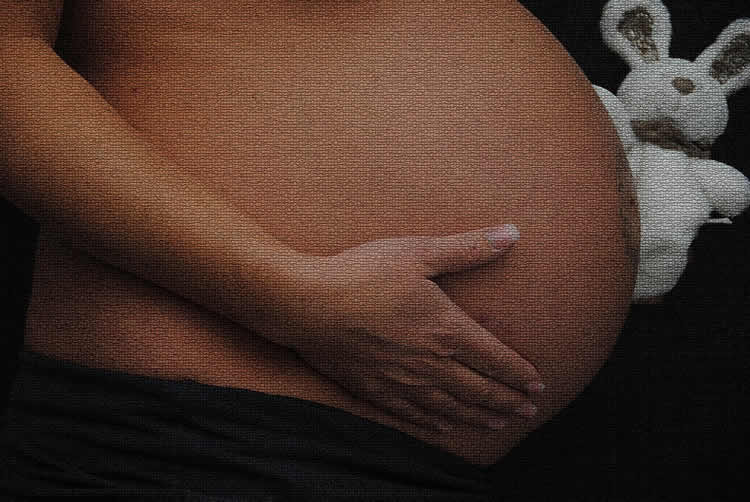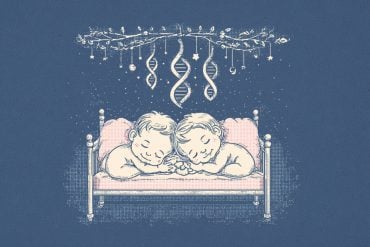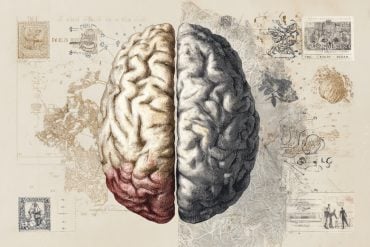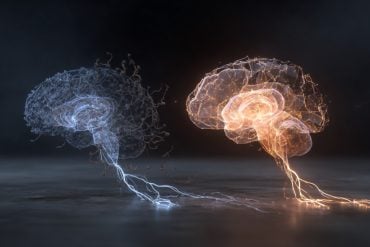Summary: Researchers report binge drinking during pregnancy and lactation may result in an increased risk of mood problems and alcohol abuse in offspring as they reach adolescence.
Source: Frontiers.
Binge drinking by pregnant and lactating mothers can impair the mental health of their offspring, reports a study published today in Frontiers in Psychiatry. In a rat model, Italian researchers find that while habitual drinking is associated with anxiety type of behaviors in mothers and their offspring, intermittent or binge drinking has a depressive effect. Moreover, offspring of binge-drinking mothers were less responsive to natural stimuli, showed greater “despair” behavior, and were more vulnerable to alcohol abuse during adolescence. This is the first study to show that alcohol-triggered changes in the mother can be passed on to her offspring.
It is commonly assumed that alcohol is easily discontinued during pregnancy, as recommended by physicians. “But this is not always the case for habitual drinkers,” says Dr. Carla Cannizzaro, the lead author of the study. “Pregnant women might also think intermittent social drinking is less harmful than daily drinking.”
To examine the consequences of maternal drinking — either continuously or intermittently — Cannizzaro and co-workers at the Università degli Studi di Palermo, Italy, used a rat model. In the study, pregnant and lactating female rats were given water that contained alcohol in a manner that mimicked habitual and binge drinking in women. At the end of the study period, the rat mothers and their offspring underwent a battery of tests to assess mood and behavior.
The intermittent, binge-drinking pattern induced deep alterations in the mood of the rat mothers, who showed depressive behaviors. Continuous or habitual drinking was instead related to an increase in anxiety-like behaviors.
Strikingly, the offspring of binge-drinking mothers were more vulnerable to alcohol abuse during adolescence. This might be a result of early alcohol exposure together with genetic changes passed on from the mother, explains Cannizzaro. “Alcohol or other drugs of abuse — in chronic or in excessive amounts — can imprint genetic encoding and promote heritable modifications.”
Offspring of binge-drinking mothers also showed low responses to natural stimuli that are usually rewarding, such as sugar, food and sex. And in the absence of alcohol, they exhibited “despair” type of behavior in response to awkward environmental conditions.

“Chronic and binge alcohol use can disrupt the homeostasis of brain regions relevant for reward,” says Cannizzaro. “Such use may lead to addiction, craving, loss of control over the use of the substance and severe withdrawal symptoms when the substance is interrupted.”
A possible limitation for this study is that it was performed in rats. However, according to the researchers, this animal model is particularly suitable for studying the addictive properties of drugs and their effects on the brain.
“Alcohol indeed exerts a powerful effect on the organism, even when consumed twice or three times a week in high concentrations,” states Cannizzaro. “We hope this research will encourage young women of reproductive age to keep away from alcohol.”
Source: Emma Duncan – Frontiers
Publisher: Organized by NeuroscienceNews.com.
Image Source: NeuroscienceNews.com image is in the public domain.
Original Research: Open access research for “Pre-conceptional and Peri-Gestational Maternal Binge Alcohol Drinking Produces Inheritance of Mood Disturbances and Alcohol Vulnerability in the Adolescent Offspring” by Anna Brancato, Valentina Castelli, Angela Cavallaro, Gianluca Lavanco, Fulvio Plescia and Carla Cannizzaro in Frontiers in Psychiatry. Published April 23 2018.
doi:10.3389/fpsyt.2018.00150
[cbtabs][cbtab title=”MLA”]Frontiers “Maternal Binge Drinking Linked to Mood Problems and Alcohol Abuse in Offspring.” NeuroscienceNews. NeuroscienceNews, 25 April 2018.
<https://neurosciencenews.com/maternal-binge-drinking-mood-8875/>.[/cbtab][cbtab title=”APA”]Frontiers (2018, April 25). Maternal Binge Drinking Linked to Mood Problems and Alcohol Abuse in Offspring. NeuroscienceNews. Retrieved April 25, 2018 from https://neurosciencenews.com/maternal-binge-drinking-mood-8875/[/cbtab][cbtab title=”Chicago”]Frontiers “Maternal Binge Drinking Linked to Mood Problems and Alcohol Abuse in Offspring.” https://neurosciencenews.com/maternal-binge-drinking-mood-8875/ (accessed April 25, 2018).[/cbtab][/cbtabs]
Abstract
Pre-conceptional and Peri-Gestational Maternal Binge Alcohol Drinking Produces Inheritance of Mood Disturbances and Alcohol Vulnerability in the Adolescent Offspring
Although binge drinking is on the rise in women of reproductive age and during pregnancy, the consequences in the offspring, in particular the inheritance of alcohol-related mood disturbances and alcohol abuse vulnerability, are still poorly investigated. In this study, we modeled both Habitual- and Binge Alcohol Drinking (HAD and BAD) in female rats by employing a two-bottle choice paradigm, with 20% alcohol and water. The exposure started 12 weeks before pregnancy and continued during gestation and lactation. The consequences induced by the two alcohol drinking patterns in female rats were assessed before conception in terms of behavioral reactivity, anxiety- and depressive-like behavior. Afterwards, from adolescence to young-adulthood, male offspring was assessed for behavioral phenotype and alcohol abuse vulnerability. At pre-conceptional time BAD female rats showed higher mean alcohol intake and preference than HAD group; differences in drinking trajectories were attenuated during pregnancy and lactation. Pre-conceptional BAD induced a prevalent depressive/anhedonic-like behavior in female rats, rather than an increase in anxiety-like behavior, as observed in HAD rats. In the adolescent offspring, peri-gestational BAD did not affect behavioral reactivity in the open field and anxiety-like behavior in the elevated plus maze. Rather, BAD dams offspring displayed higher despair-behavior and lower social interaction with respect to control- and HAD dams progeny. Notably, only binge drinking exposure increased offspring vulnerability to alcohol abuse and relapse following forced abstinence. This is the first report showing that binge-like alcohol consumption from pre-conceptional until weaning induces relevant consequences in the affective phenotype of both the mothers and the offspring, and that such effects include heightened alcohol abuse vulnerability in the offspring. These findings highlight the need for more incisive public education campaigns about detrimental consequences of peri-gestational alcohol exposure.






